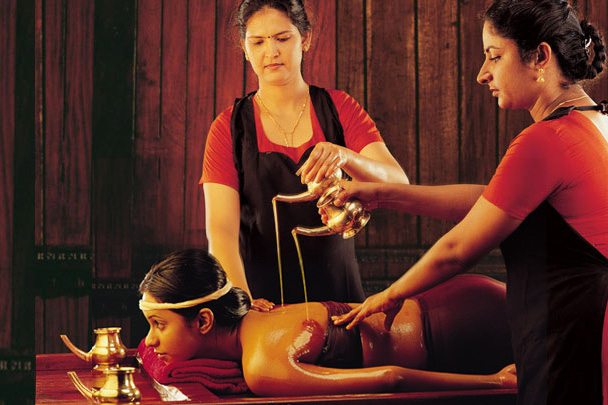Sri Lanka’s tourism should integrate economy to drive growth: Hotelier

Dhara, one of the popular ayurveda therapies in Kerala
Sep 28, 2015 (LBO) – Sri Lanka’s tourism industry which is booming post-conflict should ideally integrate the economy in to the sector to drive sustainable tourism though economically viable products, an hotelier said.
“In all our efforts we should strive to integrate the economy to the industry, so that we have authentic, sustainable tourism products which are economically feasible,” Ajit Gunewardene, President of Cinnamon Hotels & Resorts told a forum held Monday at Colombo.
“This will ensure that we do not destroy what is good, what is unique and what is valuable, but rather enhance it.”
Sri Lanka is popularized for sun and beach also offer diverse characteristics and experiences, the landscape, the people, the culture, the food, all unique and un-spoilt.
However the tourism experts still argue whether the Indian Ocean Island has branded enough of these products and experience to attract more visitors.
Sri Lanka had 1,172,465 tourists in the eight months ended August 2015 up 17.1 percent compare to the same period of 2014 data showed.
According to the released data by Central Bank, earnings from tourism are estimated to have increased by 31.2 per cent to 279.9 million US dollars in July 2015 compared to 213.3 million US dollars recorded in July 2014.
Consequently, the cumulative earnings from tourism increased by 16.8 per cent to 1,601.2 million US dollars during the first seven months of 2015 in comparison to 1,371.2 million US dollars recorded during the same period in 2014.
Gunewardene says the tourism industry has the potential to cure many if not all the ills of the country.
“Be it the balance of payments deficit, creation of employment, attraction of investment and generation of revenue to the government,”
“It can be a significant contributor for long term economic growth. It is in fact the low hanging fruit. It is the Golden Egg,”
However he argues that the industry has reached crossroads in moving ahead, but should offer right when catering to the tomorrow’s tourist who will come to Sri Lanka in search of authentic experiences.
Gunewardene says one of the roads is to allow ad hoc un-planned development with very little oversight, quality checks and regulation.
“There is a school of thought that believes this route, where self-regulation and market forces determine the equilibrium, is the way forward.”
The other path is to create - on what is essentially a blank canvas, a unique and sustainable industry where all stakeholders will benefit over the long term.
“Some may call it the utopian road,” Gunewardene said.
“An industry that focusses on minimum quality standards, manages and monitors over-visitation and over-development, protects national treasures and resources etc. Essentially an industry that doesn’t kill the goose that lays the golden egg.”
Globally a new way of travelling has emerged described as 'deep' travel. This is all about getting under the skin of a place. The modern traveller already seeks out authenticity and real experiences rather than fake culture packaged-up for tourists.
But travel in 2020 and beyond, will go further - it will be about the appreciation of local distinctiveness, the idiosyncrasies and the detail, the things that make a place unique and special, Gunawardene said.
“It will be about the fragrance of fresh Sri Lankan spices cooked in a village home in Dambulla, it will be about spending a night in a Cattle farmer’s tree house in Tissamaharama and enjoying a black tea served in a coconut shell, it will be about the feeling when you are in the middle of the ocean off Mirissa right beside the blue whale, in awe of the natural world,”
“It could be about getting away from the busy, fast-paced routine and appreciating the serenity in the lifestyle of a hermit in any of the sanctuaries or monasteries in Sri Lanka. Or even in Colombo – which is set to be the modern and vibrant metropolis of South Asia, we should look to create the mix of the future while retaining the best of the past,”
“The hustle and bustle of street life and the markets, with the glitz and glamour of contemporary urbanity,”
“Today we have reached a crossroads. We are at a juncture where we have the opportunity to create a long term tourism product and have to make the decision as to which road we will take,”
“If we do not take the right decisions today, we won’t be able to offer these tomorrow.” Gunawardene added.

I believe the whale watching industry has reached a global standard in Sri Lanka – Try mirissa and the blue whales off its coast –